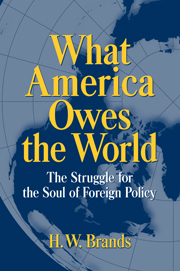Book contents
- Frontmatter
- Contents
- Preface
- 1 Exceptionalists All! The First Hundred Years
- 2 Brooks Adams: Marx for Imperialists
- 3 Walter Lippmann and a New Republic for a New Era
- 4 When the Future Worked and the Trains Ran on Time: Lincoln Steffens
- 5 Dr. Beard's Garden
- 6 Kennan, Morgenthau, and the Sources of Superpower Conduct
- 7 Reinhold Niebuhr and the Foreign Policy of Original Sin
- 8 God Blinked but Herman Didn't
- 9 On Wisconsin: Madison and Points Left
- 10 The Brief of Norman's Woe: Commentary and the New Conservatism
- 11 It Ain't Over till It's Over – and Not Even Then
- Note on Sources
- Index
6 - Kennan, Morgenthau, and the Sources of Superpower Conduct
Published online by Cambridge University Press: 25 March 2010
- Frontmatter
- Contents
- Preface
- 1 Exceptionalists All! The First Hundred Years
- 2 Brooks Adams: Marx for Imperialists
- 3 Walter Lippmann and a New Republic for a New Era
- 4 When the Future Worked and the Trains Ran on Time: Lincoln Steffens
- 5 Dr. Beard's Garden
- 6 Kennan, Morgenthau, and the Sources of Superpower Conduct
- 7 Reinhold Niebuhr and the Foreign Policy of Original Sin
- 8 God Blinked but Herman Didn't
- 9 On Wisconsin: Madison and Points Left
- 10 The Brief of Norman's Woe: Commentary and the New Conservatism
- 11 It Ain't Over till It's Over – and Not Even Then
- Note on Sources
- Index
Summary
Months after Beard's death, the Senate commenced consideration of a treaty that killed the continentalism he spent the 1930s advocating. A few irreconcilables joined Robert Taft in pronouncing the Atlantic alliance a snare, a delusion, and a repudiation of tested tradition, but a solid majority of Americans – and two-thirds of the Senate – refused to risk a withdrawal from international affairs like that which, they believed, had played a significant part in producing World War II. The twentieth century reached the halfway mark with the United States for the first time formally pledged to defend territory it didn't own.
A variety of factors contributed to America's embrace of what became within a few years a policy of global vindicationism. The most obvious and frequently cited was the failure of appeasement during the 1930s. Had the democracies called Hitler's bluff at Munich, the conventional wisdom contended, either he would have backed down or the Germans would have toppled him, or both. In any case, the late world war wouldn't have happened. Whatever the historical accuracy of this line of reasoning, and whether or not what might have worked against Hitler was required against Stalin and later Mao, the no-more-Munichs line provided the principal justification for Americans’ redefinition of their country's foreign policy.
At a deeper level, the argument for global activism amounted to little more than an elaboration of the case the vindicators had been making for sixteen decades.
- Type
- Chapter
- Information
- What America Owes the WorldThe Struggle for the Soul of Foreign Policy, pp. 144 - 181Publisher: Cambridge University PressPrint publication year: 1998



